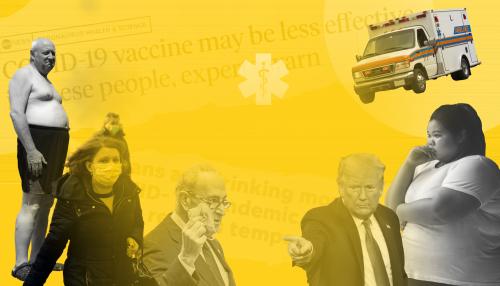These policy ideas are adapted from A New Contract with the Middle Class by Richard Reeves and Isabel Sawhill.
The presidential debates are upon us: President Trump and former Vice President Biden face-off for the first time on September 29. The stakes are high. This year has been wrought with tragedy and hardship for many Americans, and the brokenness of our society is more visible than ever. Not only has COVID-19 affected the country’s health, but it has also hit the labor market hard, leaving many Americans out of work and struggling to balance their finances, child care, and mental well-being.
No doubt, these issues will be top-of-mind for the presidential candidates, especially in their first debate when COVID-19 and the economy are two of the topics for discussion.
But while the challenges are great, so too the prospects for serious reform. The Future of the Middle Class team proposes ten policies, adapted from A New Contract with the Middle Class, that, if implemented, would improve the quality of life for middle-class Americans across five key dimensions – money, time, relationships, health, and respect.
- Eliminating income tax for most middle class families: We propose eliminating income tax for two out three middle class families, by raising the standard deduction for a married couple to $100,000 a year ($50,000 for singles) This change could be paid for with new or higher taxes on the “three Cs”: capital, consumption, and carbon.
- Scholarships for Service: As part of a broader universal national service program, we advocate tuition-free college for national service volunteers to raise skills and strengthen civic society; Specifically, anybody completing a year of full-time national service, either military or civilian, would be entitled to two years of tuition-free education at any public higher education institution in their home state, including technical and vocational colleges, or at a government-subsidized apprenticeship with an employer.

- Twenty days of guaranteed paid leave: As the figure above shows, Americans receive less time off than many other countries. To lessen the time squeeze facing the middle class and create more stability, we propose an annual paid leave minimum. By keeping the policy broad rather than categorical, workers have the flexibility to use leave for what they need, whether it’s illness, vacation, or child or elder care.
- Mid-career sabbaticals: We propose a new social insurance benefit to cover mid-career time off for care, work, or retraining. Specifically, this would mean creating two new accounts within the existing Social Security system: one for lifelong learning and one for paid family leave. These accounts could be used for training to upgrade skills, starting a new business, or caring for a relative. They would be linked to wages (up to a certain limit) and cover up to 12 weeks of leave. It could be used in combination with the 20 days of general paid leave.
- No-cost family planning: Policy makers should provide universal access to effective, no-cost family planning by increasing awareness of contraception options through medical intake forms and marketing campaigns, eliminating cost as envisioned in the Affordable Care Act, and providing funding to medical schools and non-profits to train health providers, especially those in public health clinics. This additional training has been shown to increase the use of effective forms of contraception and reduce unplanned pregnancies dramatically.
- A national tax on sugary drinks: COVID-19 has highlighted the general state of America’s health – especially in terms of pre-existing conditions, or “co-morbidities” that are associated with poorer outcomes and often affect the less affluent. While local efforts have been admirable, in order to prevent obesity and improve health, we need a national tax on sugary drinks at a rate high enough to deliver real health benefits.
Free therapy for all: Mental health care in the U.S. needs to be more accessible for everyone. There should be universal access to Cognitive Behavioral Therapy in all public schools and colleges, as well as for those performing civilian or military service. We also urge ensuring that Medicare, Medicaid and the Affordable Care Act (as well as a new public option) provide for first-dollar coverage of CBT for all.
Mandatory attendance of a naturalization ceremony: High schoolers should attend a U.S. naturalization ceremony and pass the same test immigrants must pass to become U.S. citizens, in order to receive their high school diplomas. The goal here is to improve the way that Americans view immigrants – who have historically been the source of the next middle class.
Citizens Juries: The creation of Citizens Juries would inform policymaking and operate just like legal juries, made up of randomly selected members of the public. Over the course of a few days, supported by appropriate experts and provided with high-quality information, the Citizens Jury works on a policy issue, dilemma, or decision, before providing their advice.
Social media reform: To decrease digital disrespect, we propose teaching middle and high school students how to consume and use social media, drawing on new curricula, such as those designed by Project Zero at the Harvard School of Education. Social media platforms should also be much more diligent in verifying the identities of all their users, along with fact-checking, in order to dilute the impact of “fake news.”
This is of course an illustrative rather than exhaustive list. If we truly want to improve well-being for the middle class, we must also consider raising the minimum wage, aligning school hours to working hours, providing tax incentives for corporations to train their workers and share profits broadly, and reforming labor laws and creating workers’ councils to strengthen employee engagement and bargaining power – as well as many other policies contained in the New Contract with the Middle Class.
Since we are in a political season, it is important to underline that better policies are likely to require better politics. So we must also take a closer look at our own democratic processes and should consider a series of reforms that could improve the representation of the middle class in government including: introducing a proportional voting system such as ranked-choice; reducing gerrymandering; reforming the electoral college to align results with the popular vote (perhaps through an interstate compact); granting Statehood to the District of Columbia (ending what Alice Rivlin called “an anomaly and an anachronism”); and, most urgently of all, curbing voter suppression. Some of these ideas will no doubt take center stage, as the integrity of the election is another topic slated for discussion the first night of debates.
Taken together, these policies can improve the quality of life for the middle class. We’ll be paying close attention in the debates to see what policies the presidential candidates discuss – and what they will mean for the middle class.
The Brookings Institution is committed to quality, independence, and impact.
We are supported by a diverse array of funders. In line with our values and policies, each Brookings publication represents the sole views of its author(s).








Commentary
Ten ways to make life better for the middle class
September 29, 2020